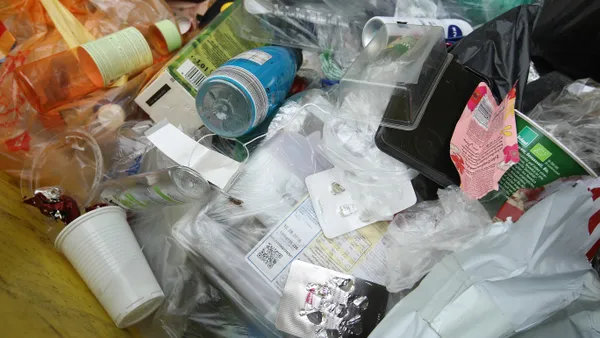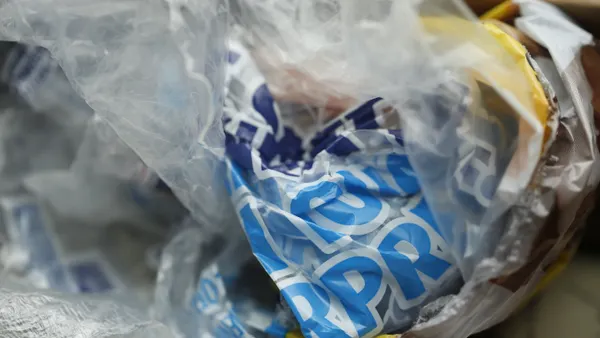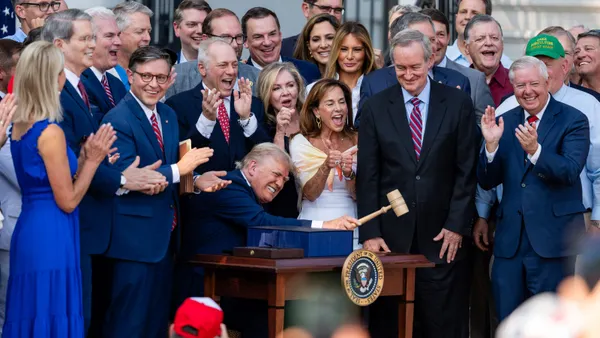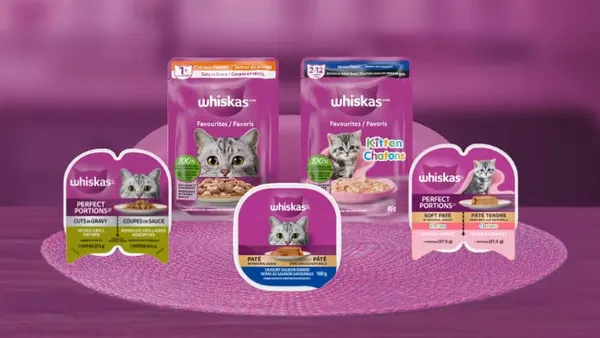Dive Brief:
- Starbucks is joining a growing group of food service companies seeking to minimize or zero out waste, with an emphasis on shifting to more recyclable containers. The international chain announced this week it will launch a new set of ambitious goals, bowing to shareholder concerns around climate change and pollution.
- In a public note from CEO Kevin Johnson, the company said it aims to switch completely to reusable packaging, expand plant-based food options, invest in supply chain sustainability, and focus on both recycling and waste reduction.
- By 2030, Starbucks is aiming for "a 50% reduction in waste sent to landfill from stores and manufacturing, driven by a broader shift toward a circular economy," along with a 50% emissions reduction and 50% replenishment for water withdrawal. "Our aspiration is to become resource positive – storing more carbon than we emit, eliminating waste, and providing more clean freshwater than we use," Johnson wrote.
Dive Insight:
Starbucks has been under pressure from shareholders to improve on the company's sustainability goals. As You Sow, a nonprofit shareholder advocacy group, has been working with Trillium Asset Management to push Starbucks on the issue.
In 2019, the partner organizations filed a shareholder proposal requesting Starbucks revive a lapsed effort to recycle its packaging in developing markets, in addition to serving at least a quarter of its beverages in reusable containers. That proposal garnered support from 44% of shares voted, per As You Sow, or the equivalent of more than $20 billion.
The organizations refiled the proposal in 2020 after Starbucks failed to respond in 2019. The company responded with the new goals laid out by Johnson this week and the shareholder proposal has been withdrawn in response.
Conrad MacKerron, senior vice president for As You Sow, told Waste Dive that with the announcement Starbucks has become "the biggest company to make a commitment of this type." As You Sow is not currently pushing any other companies on reusables, but is encouraging fast-food companies on "more preliminary steps," he said.
That includes Yum! Brands (which operates KFC, Pizza Hut and Taco Bell) and Restaurant Brands International (Tim Hortons and Burger King), both of which As You Sow is pushing to "ban foam cups, stop using plastic straws, and collect packaging on site for recycling."
Starbucks' decision to focus on reusables and recyclables is notable at a time when some companies are opting to emphasize compostables and biodegradable options. Part of the company's revived efforts include continuing its NextGen Cup Challenge, which seeks to make beverage containers more recyclable and compostable in various markets.
That consortium seeks mostly to increase the recyclability of cups by removing or reducing the plastic coating that can make them a challenge for repulping in paper mills. Some companies involved in the challenge, like Vessel, operate refill and return operations, another option.
Kate Daly, a managing director with NextGen founding partner Closed Loop Partners, applauded Starbucks and called cup development "complex" but highlighted the consortium's ongoing work.
"[We are] working to identify, test and scale sustainable solutions that include reusable cup systems, innovative new cup materials and new liners for the fiber cup," Daly said.
Rhodes Yepsen, executive director for the Biodegradable Products Institute (BPI), praised the company's decision but caveated that reusables are not always a viable option at large chains.
"It’s going to take time to transition and create a culture change for reusables, so it is important that we not lose sight of the remaining single-use items," he said, encouraging compostables as a viable alternative to the paper and plastics-based cups Starbucks has struggled to recycle.
Compostable and biodegradable packaging are indeed making headway with some companies. Chains like Sweetgreen have long touted their compostable bowls — despite some notable challenges — and Taco Bell announced this year the company aims to completely transition to compostable, recyclable, and reusable packaging by 2025. But Starbucks' focus on recyclables and reusables over compostables highlights the drawbacks of the latter.
"Compostables are risky to promote as less than 10% of the population has access to industrial composting, so in many areas compostables would be landfilled," said MacKerron, who advised that greater regional or national buy-in for composting infrastructure is needed before such a push. "Places that currently have composting capacity like Seattle and [San Francisco] report composters finding a lot of non-compostable material being sent their way, which they have to send to landfill."
Other companies have also nodded to those hurdles. Blue Bottle, an upscale coffee chain, said in December it is seeking to pivot from currently compostable foodservice ware to reusables over concerns about landfilling.









